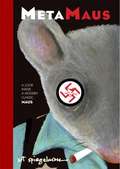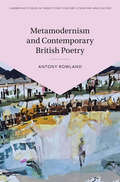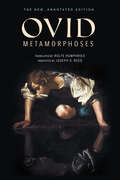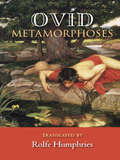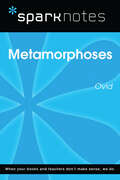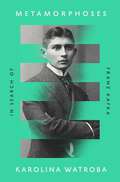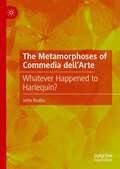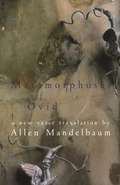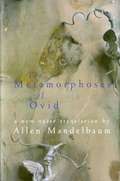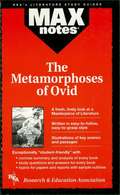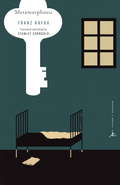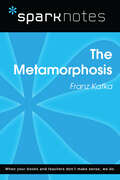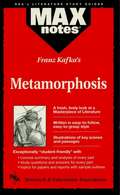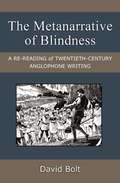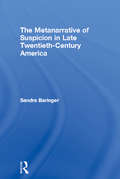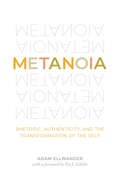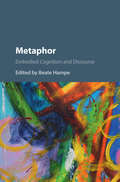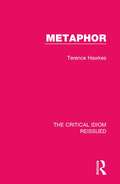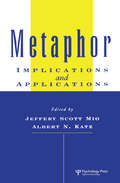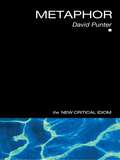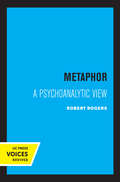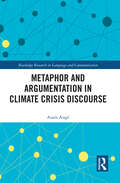- Table View
- List View
MetaMaus: A Look inside a Modern Classic, Maus
by Art SpiegelmanMETAMAUS is built around a series of taped conversations with Hillary Chute. (She is currently Neubauer Family Assistant Professor in the English Department at the University of Chicago and was previously a Junior Fellow in Literature in the Society of Fellows at Harvard University.)
Metamodernism and Contemporary British Poetry (Cambridge Studies in Twenty-First-Century Literature and Culture)
by Antony RowlandThis book discusses contemporary British poetry in the context of metamodernism. The author argues that the concept of metamodernist poetry helps to recalibrate the opposition between mainstream and innovative poetry, and he investigates whether a new generation of British poets can be accurately defined as metamodernist. Antony Rowland analyses the ways in which contemporary British poets such as Geoffrey Hill, J. H. Prynne, Geraldine Monk and Sandeep Parmar have responded to the work of modernist writers as diverse as T. S. Eliot, H. D. and Antonin Artaud, and what Theodor Adorno describes as the overall enigma of modern art.
Metamorphoses: The New, Annotated Edition
by Rolfe Humphries Ovid Joseph D. Reed"So easy to read that one may have to think twice to realize these tales are nearly 2,000 years old." –Washington Post "One of the most captivating books ever written" —The New York Times Ovid’s Metamorphoses is one of the most influential works of Western literature, inspiring artists and writers from Titian to Shakespeare to Salman Rushdie. These are some of the most famous Roman myths as you’ve never read them before—sensuous, dangerously witty, audacious—from the fall of Troy to birth of the minotaur, and many others that only appear in the Metamorphoses. Connected together by the immutable laws of change and metamorphosis, the myths tell the story of the world from its creation up to the transformation of Julius Caesar from man into god. In the ten-beat, unrhymed lines of this now-legendary and widely praised translation, Rolfe Humphries captures the spirit of Ovid’s swift and conversational language, bringing the wit and sophistication of the Roman poet to modern readers. This special annotated edition includes new, comprehensive commentary and notes by Joseph D. Reed, Professor of Classics and Comparative Literature at Brown University.
Metamorphoses
by Ovid<P>The first and still the best modern verse translation of the Metamorphoses, Humphries' version of Ovid's masterpiece captures its wit, merriment, and sophistication. <P>Everyone will enjoy this first modern translation by an American poet of Ovid's great work, the major treasury of classical mythology, which has perennially stimulated the minds of men. In this lively rendering there are no stock props of the pastoral and no literary landscaping, but real food on the table and sometimes real blood on the ground. <P>Not only is Ovid's Metamorphoses a collection of all the myths of the time of the Roman poet as he knew them, but the book presents at the same time a series of love poems--about the loves of men, women, and the gods. There are also poems of hate, to give the proper shading to the narrative. And pervading all is the writer's love for this earth, its people, its phenomena. <P>Using ten-beat, unrhymed lines in his translation, Rolfe Humphries shows a definite kinship for Ovid's swift and colloquial language and Humphries' whole poetic manner is in tune with the wit and sophistication of the Roman poet. <P>[This text is listed as an example that meets Common Core Standards in English language arts in grades 9-10 at http://www.corestandards.org.]
Metamorphoses (SparkNotes Literature Guide Series)
by SparkNotesMetamorphoses (SparkNotes Literature Guide) by Ovid Making the reading experience fun Created by Harvard students for students everywhere, SparkNotes is a new breed of study guide: smarter, better, faster. Geared to what today's students need to know, SparkNotes provides: *Chapter-by-chapter analysis *Explanations of key themes, motifs, and symbols *A review quiz and essay topicsLively and accessible, these guides are perfect for late-night studying and writing papers
Metamorphoses: In Search of Franz Kafka
by Karolina WatrobaThis groundbreaking study of Franz Kafka&’s legacy—to be published during the centenary of his death in 2024—explores Kafka&’s life and influence in an entirely new and dynamic way.In 2024, exactly one hundred years after his death at the age of forty, readers all over the world will reach for the works of Franz Kafka. Many of them will want to learn more about the enigmatic man behind the classic books filled with mysterious courts and monstrous insects. Who, exactly, was Franz Kafka? Karolina Watroba, the first Germanist ever elected as a fellow of Oxford's All Souls College, will tell Kafka's story beyond the boundaries of language, time, and space, traveling from the Prague of Kafka's birth through the work of contemporary writers in East Asia, whose award-winning novels are, in part, homages to the great man himself. Metamorphoses presents a non-chronological journey through Kafka's life, combining literary scholarship with the responses of his readers throughout the last century. It is a both an exploration of Kafka's life and an exciting new way of approaching literary history.
The Metamorphoses of Commedia dell’Arte: Whatever Happened to Harlequin?
by John RudlinThe Metamorphoses of Commedia dell’Arte traces the steps by which Commedia has been transformed by cultural contact outside Italy into popular forms which bear little resemblance to the original. The book follows the Masks of Arlecchino, Pedrolino and Pulcinella as they gradually migrate and mutate into Harlequin, Mr. Punch and seaside Pierrot troupes. What happened to Pantalone, Scaramouche, Colombina and the male Lover is also investigated, though they had no final forms of their own. This study constitutes a history of what happened, notably in France and Great Britain, to a supremely popular theatrical genre as a result of changing fashions in entertainment brought on by societal developments, civil and industrial revolution and dynastic change. It investigates how the genre was exploited by management, and even its own stars, lost its vitality and gradually ended up in ‘sunken’ forms.
The Metamorphoses of Ovid
by Allen MandelbaumThrough Mandelbaum’s poetic artistry, this gloriously entertaining achievement of literature-classical myths filtered through the worldly and far from reverent sensibility of the Roman poet Ovid-is revealed anew. “[An] extraordinary translation...brilliant” (Booklist). With an Introduction by the Translator.
The Metamorphoses of Ovid (MAXNotes Literature Guides)
by Dalma BrunauerREA's MAXnotes for Ovid's The Metamorphoses of Ovid MAXnotes offer a fresh look at masterpieces of literature, presented in a lively and interesting fashion. Written by literary experts who currently teach the subject, MAXnotes will enhance your understanding and enjoyment of the work. MAXnotes are designed to stimulate independent thought about the literary work by raising various issues and thought-provoking ideas and questions. MAXnotes cover the essentials of what one should know about each work, including an overall summary, character lists, an explanation and discussion of the plot, the work's historical context, illustrations to convey the mood of the work, and a biography of the author. Each chapter is individually summarized and analyzed, and has study questions and answers.
The Metamorphosis
by Franz Kafka Stanley CorngoldThe Metamorphosis is the story of a young man who, transformed overnight into a giant beetlelike insect, becomes an object of disgrace to his family, an outsider in his own home, a quintessentially alienated man. [This text is listed as an example that meets Common Core Standards in English language arts in grades 9-10 at http://www.corestandards.org.]
The Metamorphosis (SparkNotes Literature Guide Series)
by SparkNotes Franz KafkaLiterature GuidesCreated by Harvard students for students everywhere, SparkNotes is a new breed of study guide: smarter, better, faster. Geared to what todays students need to know, SparkNotes provides: *Chapter-by-chapter analysis*Explanations of key themes, motifs, and symbols*A review quiz and essay topicsLively and accessible, these guides are perfect for late-night studying and writing papers
Metamorphosis (MAXNotes Literature Guides)
by Stanley TaikeffMAXnotes offer a fresh look at masterpieces of literature, presented in a lively and interesting fashion. Written by literary experts who currently teach the subject, MAXnotes will enhance your understanding and enjoyment of the work. MAXnotes are designed to stimulate independent thought about the literary work by raising various issues and thought-provoking ideas and questions. MAXnotes cover the essentials of what one should know about each work, including an overall summary, character lists, an explanation and discussion of the plot, the work's historical context, illustrations to convey the mood of the work, and a biography of the author. Each chapter is individually summarized and analyzed, and has study questions and answers.
The Metanarrative Of Blindness: A Re-reading Of Twentieth-century Anglophone Writing
by David Bolt<P>Although the theme of blindness occurs frequently in literature, literary criticism has rarely engaged the experiential knowledge of people with visual impairments. The Metanarrative of Blindness counters this trend by bringing to readings of twentieth-century works in English a perspective appreciative of impairment and disability. Author David Bolt examines representations of blindness in more than forty literary works, including writing by Kipling, Joyce, Synge, Orwell, H. G. Wells, Susan Sontag, and Stephen King, shedding light on the deficiencies of these representations and sometimes revealing an uncomfortable resonance with the Anglo-American science of eugenics. <P>What connects these seemingly disparate works is what Bolt calls “the metanarrative of blindness,” a narrative steeped in mythology and with deep roots in Western culture. Bolt examines literary representations of blindness using the analytical tools of disability studies in both the humanities and social sciences. His readings are also broadly appreciative of personal, social, and cultural aspects of disability, with the aim of bringing literary scholars to the growing discipline of disability studies, and vice versa. This interdisciplinary monograph is relevant to people working in literary studies, disability studies, psychology, sociology, applied linguistics, life writing, and cultural studies, as well as those with a general interest in education and representations of blindness.
The Metanarrative of Suspicion in Late Twentieth-Century America (Literary Criticism and Cultural Theory)
by Sandra BaringerNarratives of suspicion and mistrust have escaped the boundaries of specific sites of discourse to constitue a metanarrative that pervades American culture. Through close reading of texts ranging from novels (Pynchon's Vineland, Silko's Almanac of the Dead, Pierce's The Turner Diaries) to prison literature, this book examines the ways in which narratives of suspicion are both constitutive--and symptomatic--of a metanarrative that pervades American culture.
Metanoia: Rhetoric, Authenticity, and the Transformation of the Self (G - Reference, Information And Interdisciplinary Subjects Ser.)
by Adam EllwangerWestern culture is in a moment when wholly new kinds of personal transformations are possible, but authentic transformation requires both personal testimony and public recognition. In this book, Adam Ellwanger takes a distinctly rhetorical approach to analyzing how the personal and the public relate to an individual’s transformation and develops a new vocabulary that enables a critical assessment of the concept of authenticity. The concept of metanoia is central to this project. Charting the history of metanoia from its original use in the classical tradition to its adoption by early Christians as a term for religious conversion, Ellwanger shows that metanoia involves a change within a person that results in a truer version of him- or herself—a change in character or ethos. He then applies this theory to our contemporary moment, finding that metanoia provides unique insight into modern forms of self-transformation. Drawing on ancient and medieval sources, including Thucydides, Plato, Paul the Apostle, and Augustine, as well as contemporary discourses of self-transformation, such as the public testimonies of Caitlyn Jenner and Rachel Dolezal, Ellwanger elucidates the role of language in signifying and authenticating identity. Timely and original, Ellwanger’s study formulates a transhistorical theory of personal transformation that will be of interest to scholars working in social theory, philosophy, rhetoric, and the history of Christianity.
Metanoia: Rhetoric, Authenticity, and the Transformation of the Self
by Adam EllwangerWestern culture is in a moment when wholly new kinds of personal transformations are possible, but authentic transformation requires both personal testimony and public recognition. In this book, Adam Ellwanger takes a distinctly rhetorical approach to analyzing how the personal and the public relate to an individual’s transformation and develops a new vocabulary that enables a critical assessment of the concept of authenticity. The concept of metanoia is central to this project. Charting the history of metanoia from its original use in the classical tradition to its adoption by early Christians as a term for religious conversion, Ellwanger shows that metanoia involves a change within a person that results in a truer version of him- or herself—a change in character or ethos. He then applies this theory to our contemporary moment, finding that metanoia provides unique insight into modern forms of self-transformation. Drawing on ancient and medieval sources, including Thucydides, Plato, Paul the Apostle, and Augustine, as well as contemporary discourses of self-transformation, such as the public testimonies of Caitlyn Jenner and Rachel Dolezal, Ellwanger elucidates the role of language in signifying and authenticating identity. Timely and original, Ellwanger’s study formulates a transhistorical theory of personal transformation that will be of interest to scholars working in social theory, philosophy, rhetoric, and the history of Christianity.
Metaphor
by Denis DonoghueDenis Donoghue turns his attention to the practice of metaphor and to its lesser cousins, simile, metonym, and synecdoche. Metaphor ("a carrying or bearing across") supposes that an ordinary word could have been used in a statement but hasn't been. Instead, something else, something unexpected, appears. The point of a metaphor is to enrich the reader's experience by bringing different associations to mind. The force of a good metaphor is to give something a different life, a new life. The essential character of metaphor, Donoghue says, is prophetic. Metaphors intend to change the world by changing our sense of it. At the center of Donoghue's study is the idea that metaphor permits the greatest freedom in the use of language because it exempts language from the local duties of reference and denotation. Metaphors conspire with the mind in its enjoyment of freedom. Metaphor celebrates imaginative life par excellence, from Donoghue's musings on Aquinas' Latin hymns, interspersed with autobiographical reflection, to his agile and perceptive readings of Wallace Stevens. When Donoghue surveys the history of metaphor and resistance to it, going back to Aristotle and forward to George Lakoff, he is a sly, cogent, and persuasive companion. He also addresses the question of whether or not metaphors can ever truly die. Reflected on every page of Metaphor are the accumulated wisdom of decades of reading and a sheer love of language and life.
Metaphor: Embodied Cognition and Discourse
by Beate HampeMetaphor theory has shifted from asking whether metaphor is 'conceptual' or 'linguistic' to debating whether it is 'embodied' or 'discursive'. Although recent work in the social and cognitive sciences has yielded clear opportunities to resolve that dispute, the divide between discourse- and cognition-oriented approaches has remained. To unite the field, this book brings together leading metaphor researchers from a number of disciplines. It collects major arguments and presents a wide variety of empirical evidence, placing special emphasis on the embodiment and socio-cultural embeddedness of cognition, as well as the multi-modal and social-interactive nature of communication. It shows that metaphor theory can only profit from an approach that takes multiple perspectives into consideration and tries to account for findings yielded by multiple methodologies. By doing so, it works towards a dynamic, multi-dimensional, socio-cognitive model of metaphor that goes beyond what research traditions have separately achieved.
Metaphor (The Critical Idiom Reissued #24)
by Terence HawkesFirst published in 1972, this work examines the complex concept of metaphor. It defines the term by placing the various key ideas about the nature of metaphor in their literary and social context, and in doing so, it traces the developing history of the concept. This account has considerable range, beginning with Aristotle and ending with the work of modern linguist and anthropologists. From this analysis emerge two opposed yet complementary ideas: the classical view of metaphor, which sees metaphor as a detachable device imported into language, and the romantic view, which sees metaphor as inseparable from language. This book will be of interest to those studying English literature and language.
Metaphor: Implications and Applications
by Jeffery Scott Mio Albert N. KatzResearch on metaphor has been dominated by Aristotelian questions of processes in metaphor understanding. Although this area is important, it leaves unasked Platonic questions of how structures of the mind affect such processes. Moreover, there has been relatively little work on how metaphors affect human behavior. Although there are numerous postdictive or speculative accounts of the power of metaphors to affect human behavior in particular areas, such as clinical or political arenas, empirical verification of these accounts has been sparse. To fill this void, the editors have compiled this work dedicated to empirical examination of how metaphors affect human behavior and understanding. The book is divided into four sections: metaphor and pragmatics, clinical uses of metaphor, metaphor and politics, and other applications of metaphor. Chapters contained within these sections attempt to merge Aristotelian questions with Platonic ones.
Metaphor (The New Critical Idiom)
by David PunterMetaphor is a central concept in literary studies, but it is also prevalent in everyday language and speech. Recent literary theories such as postmodernism and deconstruction have transformed the study of the text and revolutionized our thinking about metaphor. In this fascinating volume, David Punter: establishes the classical background of the term from its philosophical roots to the religious and political tradition of metaphor in the East relates metaphor to the public realms of culture and politics and the way in which these influence the literary examines metaphor in relation to literary theory, philosophy, psychoanalysis and postcolonial studies illustrates his argument with specific examples from western and eastern literature and poetry. This comprehensive and engaging book emphasizes the significance of metaphor to literary studies, as well as its relevance to cultural studies, linguistics and philosophy.
Metaphor
by L. David Ritchie'Metaphor', a form of figurative language in which one thing or idea is expressed in terms of another, is becoming an increasingly popular area of study, as it is relevant to the work of semanticists, pragmatists, discourse analysts and also those working at the interface of language and literature and in other disciplines such as philosophy and psychology. This book provides a summary, critique and comparison of the most important theories on how metaphors are used and understood, drawing on research from linguistics, psychology and other disciplines. In order to ground the discussion in actual language use, the book uses examples from discourse, including casual conversations, political speeches, literature, humor, religion and science. Written in a non-technical style, the book includes clear definitions, examples, discussion questions and a glossary, making it ideal for graduate-level seminars.
Metaphor: A Psychoanalytic View
by Robert RogersThis title is part of UC Press's Voices Revived program, which commemorates University of California Press’s mission to seek out and cultivate the brightest minds and give them voice, reach, and impact. Drawing on a backlist dating to 1893, Voices Revived makes high-quality, peer-reviewed scholarship accessible once again using print-on-demand technology. This title was originally published in 1978.
Metaphor and Argumentation in Climate Crisis Discourse (Routledge Research in Language and Communication)
by Anaïs AugéThis volume sheds light on the argumentative role of metaphor in climate change discourse, unpacking the ways in which stakeholders use specific metaphors to influence perceptions of the climate crisis. While existing research has explored the explanatory function of metaphors in communication on climate change, this book offers an alternative view, one which posits that metaphors can go beyond disseminating scientific observations to promoting biases in the depiction of these observations. Augé analyses oft-used ideas in climate change communication, such as greenwashing, drawn from a wide-ranging corpus spanning media discourse, scientific discourse, NGO communications, political speech, and social media messages in English. The book presents an overview of different arguments conveyed through metaphors around five key themes—climate change mitigation; the evolution of climate change; global and local effects; the significance of climate change in specific countries; and the relationship between climate change and other contemporary social issues. The volume highlights how the complexity of climate change often necessitates the use of metaphor and the value of further research on the argumentative function of metaphor in elucidating its ideological dimensions in climate crisis discourse. This book will be of interest to scholars in discourse analysis, corpus linguistics, cognitive linguistics, and environmental communication.
